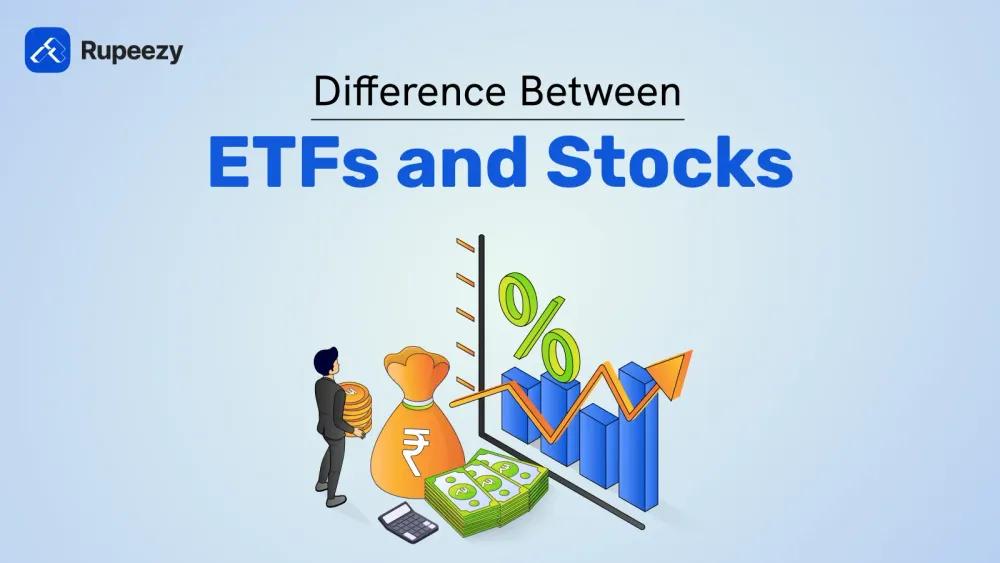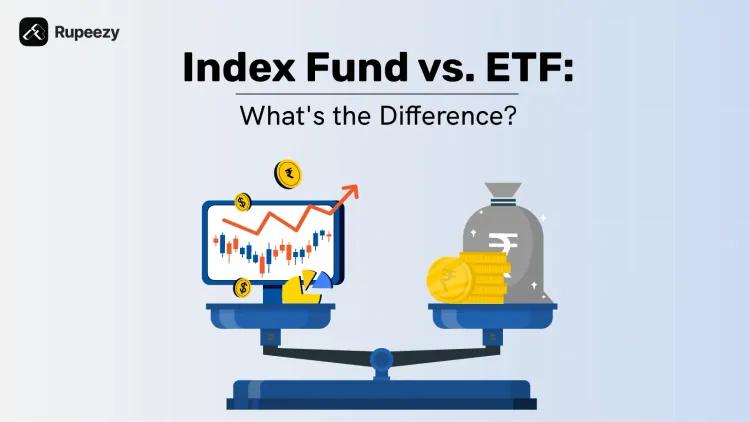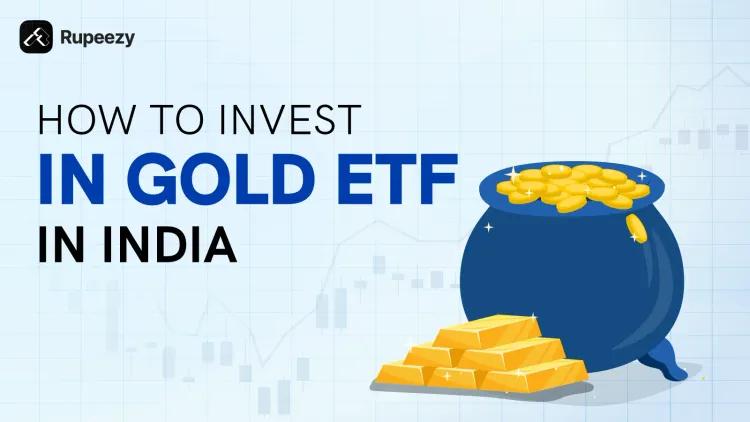ETF vs Stock - Which One is the Better Investment Option?


00:00 / 00:00
Investing in the stock market presents an exciting opportunity, offering a diverse range of options to match different financial goals and risk tolerances. Among the most popular choices are exchange-traded funds (ETFs) and individual stocks. ETFs provide a diversified portfolio with lower risk, while individual stocks offer the potential for higher returns. Both options empower investors to achieve their financial aspirations and build a secure future, making the stock market a compelling avenue for wealth creation.
Understanding the key differences between them is crucial for making informed investment decisions. This article will help one understand what ETFs and stocks are, their unique features, benefits, and potential drawbacks.
You can check out our other article on the ETF vs Index Fund and Mutual Funds vs ETFs on Rupeezy Blog.
What is an Exchange Traded Fund (ETF)?
ETFs are the funds that track the indexes in the market such as Nifty, Sensex, CNX, and more. In simple terms, when ETFs are purchased, an investor is buying the units of a portfolio that tracks the yield of a particular index. The major highlight of ETFs is that they only try to replicate the market performance of the index and not outperform/ beat the market
Here, you can invest in a collection of different asset classes like bonds, indexes and more. ETFs are traded like a common stock on an exchange and also their traded prices change throughout the day like stocks.
ETFs generally have higher liquidity and lower expenses and fees when compared to other mutual fund schemes which makes them attractive to many investors. They offer several benefits, including diversification, as they typically hold a wide range of assets, thereby reducing the risk compared to investing in a single stock.
Additionally, ETFs provide flexibility, enabling various trading strategies like short selling, limit orders, and stop-loss orders, making them an attractive option for a wide range of investor
Features of ETFs:
Intraday trading:
ETFs are traded on stock exchanges which allows investors to buy and sell them throughout the trading day at market prices, similar to normal stocks.
Diversification:
Since ETFs consist of a basket of securities, they naturally create a diversified portfolio with multiple assets thereby reducing the impact of poor performance on any security in the index.
Cost Efficiency:
ETFs generally require lower management fees and expense ratios when compared to actively managed mutual funds.
Transparency:
ETFs showcase their holdings daily, which allows investors to see exactly what assets are included in the fund. This helps investors make better decisions on their investments.
Tax Implication:
They are charged based on their holding period, if it is more than 1 year it is termed under long-term capital gains and after the exempt amount of Rs.1,25,000, they are taxed at 12.5% on the excess amount.
For short-term capital gains which are holding the assets for less than 1 year, they are taxed at 20%.
Check out our latest blogs “Best Gold ETF in India” and “Gold ETF Fund”
Pros and Cons of Exchange Traded Fund (ETF)
Pros of ETF | Cons of ETF |
Diversification: ETFs provide exposure to a wide range of securities, which can help mitigate risk. | Less Control Over Investments: When you invest in an ETF, you will be buying a pre-selected basket of securities. |
Lower Costs: ETFs have lower expense ratios compared to actively managed mutual funds. | Intraday Price Fluctuations: The ability to trade ETFs throughout the day can lead to impulsive trading decisions based on short-term price movements. |
Trading Flexibility: ETFs can be traded throughout the day at market prices. This allows for greater trading flexibility. | Lower Dividend Returns: Though there are dividend-paying ETFs, it is comparatively lower than the high dividend yields of individual stocks. |
What are Stocks?
A stock, also known as equity, is a security that signifies a proportionate ownership in a company. When you own a share, you are essentially a shareholder, which means you have a claim on a portion of the company's assets and earnings in proportion to the number of shares you hold.
Stocks are crucial for companies as they provide a way to raise capital for expansion and operations. For investors, stocks can help in wealth accumulation and portfolio diversification. Historically, stocks have outperformed other asset classes over the long term, making them a popular choice for individual and institutional investors alike.
Features of Stocks
Ownership:
Stocks represent a fractional ownership in a company, meaning the more shares you own, the larger your stake in the company.
Capital Gains:
Investors can earn money through capital gains when the stock price increases above the purchase price.
Dividends:
Generally, companies provide a portion of their earnings as dividends to their shareholders generating a source of passive income to the investors.
Market Liquidity:
Stocks are traded on various exchanges, allowing for liquidity and the ability to buy or sell shares during the day-to-day trading hours.
Tax Implication:
The tax liability of stocks is similar to that of ETFs, They are charged based on their period of holding. If it's less than one year 20% tax rate and for more than one year at 12.5% of which Rs.1,25,000 is exempt from taxes.
For investors who prefer stock investing but want to enhance their buying power, Margin Trading Facility (MTF) can be a useful option. It allows you to purchase selected stocks by paying only a partial upfront amount while the broker funds the remaining, helping you capitalize on opportunities without blocking full capital. However, it should be used with proper risk management, as leveraged positions can amplify both gains and losses.
Pros and Cons of Investing in Stocks
Pros of investing in stocks | Cons of investing in stocks |
Potential for High Returns: Stocks generate significant long-term returns, often outperforming other investment avenues such as bonds. | Market Volatility: Stock prices can be highly volatile, leading to significant fluctuations in value over short periods. |
Liquidity: Stocks are traded on exchanges, allowing investors to buy and sell shares quickly and easily during market hours. | Risk of Loss: Economic downturns or poor company performance can lead to declines in stock prices, and investors may lose their entire investment. |
Dividend Yield: Investing in a company can help investors generate a passive income if the company can generate good profits. | Control: The controlling power of any company will depend on the number of shares one holds. If an investor holds less number of shares they won't have much authoritative right in the company’s operations and vice versa. |
Key Difference Between ETF and Stock
Parameter | Exchange traded Fund (ETF) | Stocks |
Ownership | Represents ownership in a diversified portfolio of assets. | Represents ownership in a single company. |
Risk | Lower risk through diversification across multiple securities. | Higher risk due to exposure to one company. |
Volatility | Generally less volatile since the price changes are based on the diversity of holdings. | More volatility since the prices can fluctuate significantly based on company performance. |
Control | Investors have no control over the individual assets within the ETF. | Investors have full control over which stocks to buy or sell. |
Management | Often passively managed, tracking an index or sector, requires less ongoing management. | No professional management; investors must research and manage their portfolios. |
Dividends | ETF issuers decide whether to pay these dividends directly or reinvest them in the fund. | Shareholders receive dividends directly from the company’s profits. |
Stock vs ETF: Which is Better?
Stocks and ETFs each have special benefits and suit various investment approaches. ETFs offer an affordable, diversified means of increasing exposure to a wide variety of assets while lowering the risk involved with individual securities. They are a desirable choice for both inexperienced and seasoned investors since they provide flexibility in intraday trading, transparency, and reduced expense ratios.
Investing in individual equities, on the other hand, entails more risk and volatility but also offers direct ownership and the possibility of larger rewards. Although they can result in large income and monetary gains, stocks need to be carefully researched and managed.
Therefore, Investors should consider investing in ETFs or Stocks based their financial goals, risk tolerance, and investment strategy.
Stocks vs ETFs: Understand using an Example
When you buy shares of Reliance Industries Limited (RIL), you directly own a part of that specific company, and your investment's performance is tied to Reliance's business success or failure. For instance, if Reliance launches a successful new venture, its stock price may rise, benefiting shareholders. Conversely, if Reliance faces challenges or decreased profits, the stock price may fall.
In contrast, if you invest in an ETF like the UTI Nifty 50 Index Fund, you own a share of a fund that tracks the Nifty 50 index, which includes 50 of the largest and most liquid Indian companies, including Reliance Industries. This means your investment is spread across multiple companies, reducing the risk associated with any single company's performance. If Reliance performs poorly, other companies in the ETF basket might perform well, balancing the overall impact on your investment.
Therefore, while investing in Reliance stock offers high potential rewards tied to Reliance's specific performance, investing in an ETF like the UTI Nifty 50 Index Fund provides diversified exposure and reduces risk by spreading your investment across many companies.
Also Read: Best ETF in India
Conclusion
Investors should consider their financial goals, risk tolerance, and investment strategy when choosing between stocks and ETFs. Stocks are better suited for those looking for high returns and willing to take on more risk, while ETFs provide a more diversified and lower-risk investment option. Many investors find a blended approach, incorporating both stocks and ETFs, to be effective in achieving their financial objectives.
Understanding the key differences between ETF and stock can help investors make informed decisions that align with their financial goals and risk tolerance.
Which one do you think is better in ETF vs stock?
For personalized financial analysis and to invest in these opportunities, explore Rupeezy's offerings. You can start your investment journey with the Rupeezy App today and make informed investment decisions.
The content on this blog is for educational purposes only and should not be considered investment advice. While we strive for accuracy, some information may contain errors or delays in updates.
Mentions of stocks or investment products are solely for informational purposes and do not constitute recommendations. Investors should conduct their own research before making any decisions.
Investing in financial markets are subject to market risks, and past performance does not guarantee future results. It is advisable to consult a qualified financial professional, review official documents, and verify information independently before making investment decisions.

All Category










